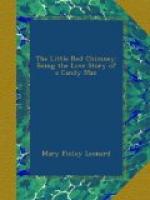CHAPTER THIRTEEN
In which the Candy Man relates his story, and the Miser comes upon Volume I of the shabby book with the funny name.
“I want you to know all about me,” began the Candy Man, taking from his pocket the shabby little book Virginia had once remarked on, “so there may be no more wrong impressions.”
They sat in the sunshine on the top step of the little pavilion, facing the river. Margaret Elizabeth, supporting her chin in her hand, regarded him gravely. The west wind was cool on their faces.
“I have often imagined myself telling you,” he went on. “Not that there is much to it, besides its strangeness. In fact, to be brief, I don’t know who I am.”
The surprise in Miss Bentley’s eyes caused him to add quickly: “Not that I am a foundling. But my father and mother were lost at sea when I was three years old. We were coming from Victoria to San Francisco, when the steamer went down. Only a few of the passengers were saved, I among them.”
“How sad and terrible!” cried Margaret Elizabeth. “Can you remember it? How lost and lonely you must have been! Poor little child!”
“I recall it only in a vague way,” he answered, “confused with what has since been told me. When it was known that my parents were lost, a man and his wife, fellow passengers, offered to adopt me. Beyond the name ‘Robert Deane, Wife and Child,’ on the list at the ship’s office, they were unable to learn anything about me, and I was too young and bewildered to give any clue.”
“That is very strange,” said Margaret Elizabeth. “Your new father and mother were kind to you?”
“So kind I soon forgot the terror and loneliness, and grew happy and content. Everything was done to make me forget, and I think while they made every effort to find out something about me, they were glad when they failed. I wish now that my childish memories might have been fostered, for I find myself reaching back into a mist full of vague shapes.
“My new father was a civil engineer, whose work took him here, there and everywhere throughout the broad West. I never knew a permanent home. My adopted mother died when I was twelve. After that came boarding school and college. About the time I left college my father’s health failed, and for several years he was helpless and very dependent upon me, so I gave up my plan of entering a mining school.
“It was during his illness that he began to speak to me of my own parents. He had talked to them on several occasions during the voyage, and he described them as young people of refinement and education. My mother, he thought from her speech, was English. They rather held aloof, he said, and seemed disinclined to mention their own affairs. While he was ill the news came to us of the finding in a storage warehouse in San Francisco of an old trunk which it seemed probable had belonged to my parents. Without going into detail, I may say it was through an old acquaintance of my adopted father’s, who knew the circumstances of my adoption, that we heard of it. He had some interest in the warehouse, which was about to be torn down and rebuilt. This trunk was found in some forgotten corner where it had lain for twenty-five years.”




